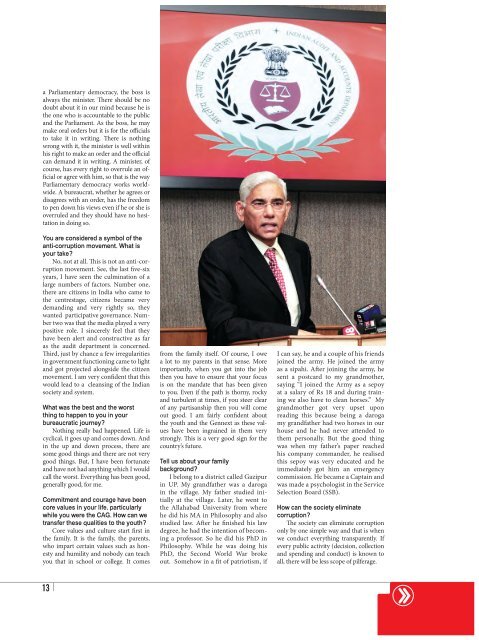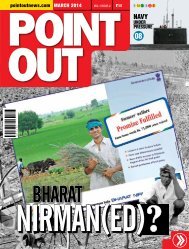POINT OUT
Create successful ePaper yourself
Turn your PDF publications into a flip-book with our unique Google optimized e-Paper software.
a Parliamentary democracy, the boss is<br />
always the minister. There should be no<br />
doubt about it in our mind because he is<br />
the one who is accountable to the public<br />
and the Parliament. As the boss, he may<br />
make oral orders but it is for the officials<br />
to take it in writing. There is nothing<br />
wrong with it, the minister is well within<br />
his right to make an order and the official<br />
can demand it in writing. A minister, of<br />
course, has every right to overrule an official<br />
or agree with him, so that is the way<br />
Parliamentary democracy works worldwide.<br />
A bureaucrat, whether he agrees or<br />
disagrees with an order, has the freedom<br />
to pen down his views even if he or she is<br />
overruled and they should have no hesitation<br />
in doing so.<br />
You are considered a symbol of the<br />
anti-corruption movement. What is<br />
your take?<br />
No, not at all. This is not an anti-corruption<br />
movement. See, the last five-six<br />
years, I have seen the culmination of a<br />
large numbers of factors. Number one,<br />
there are citizens in India who came to<br />
the centrestage, citizens became very<br />
demanding and very rightly so, they<br />
wanted participative governance. Number<br />
two was that the media played a very<br />
positive role. I sincerely feel that they<br />
have been alert and constructive as far<br />
as the audit department is concerned.<br />
Third, just by chance a few irregularities<br />
in government functioning came to light<br />
and got projected alongside the citizen<br />
movement. I am very confident that this<br />
would lead to a cleansing of the Indian<br />
society and system.<br />
What was the best and the worst<br />
thing to happen to you in your<br />
bureaucratic journey?<br />
Nothing really bad happened. Life is<br />
cyclical, it goes up and comes down. And<br />
in the up and down process, there are<br />
some good things and there are not very<br />
good things. But, I have been fortunate<br />
and have not had anything which I would<br />
call the worst. Everything has been good,<br />
generally good, for me.<br />
Commitment and courage have been<br />
core values in your life, particularly<br />
while you were the CAG. How can we<br />
transfer these qualities to the youth?<br />
Core values and culture start first in<br />
the family. It is the family, the parents,<br />
who impart certain values such as honesty<br />
and humility and nobody can teach<br />
you that in school or college. It comes<br />
from the family itself. Of course, I owe<br />
a lot to my parents in that sense. More<br />
importantly, when you get into the job<br />
then you have to ensure that your focus<br />
is on the mandate that has been given<br />
to you. Even if the path is thorny, rocky<br />
and turbulent at times, if you steer clear<br />
of any partisanship then you will come<br />
out good. I am fairly confident about<br />
the youth and the Gennext as these values<br />
have been ingrained in them very<br />
strongly. This is a very good sign for the<br />
country’s future.<br />
Tell us about your family<br />
background?<br />
I belong to a district called Gazipur<br />
in UP. My grandfather was a daroga<br />
in the village. My father studied initially<br />
at the village. Later, he went to<br />
the Allahabad University from where<br />
he did his MA in Philosophy and also<br />
studied law. After he finished his law<br />
degree, he had the intention of becoming<br />
a professor. So he did his PhD in<br />
Philosophy. While he was doing his<br />
PhD, the Second World War broke<br />
out. Somehow in a fit of patriotism, if<br />
I can say, he and a couple of his friends<br />
joined the army. He joined the army<br />
as a sipahi. After joining the army, he<br />
sent a postcard to my grandmother,<br />
saying “I joined the Army as a sepoy<br />
at a salary of Rs 18 and during training<br />
we also have to clean horses.” My<br />
grandmother got very upset upon<br />
reading this because being a daroga<br />
my grandfather had two horses in our<br />
house and he had never attended to<br />
them personally. But the good thing<br />
was when my father’s paper reached<br />
his company commander, he realised<br />
this sepoy was very educated and he<br />
immediately got him an emergency<br />
commission. He became a Captain and<br />
was made a psychologist in the Service<br />
Selection Board (SSB).<br />
How can the society eliminate<br />
corruption?<br />
The society can eliminate corruption<br />
only by one simple way and that is when<br />
we conduct everything transparently. If<br />
every public activity (decision, collection<br />
and spending and conduct) is known to<br />
all, there will be less scope of pilferage.<br />
13





